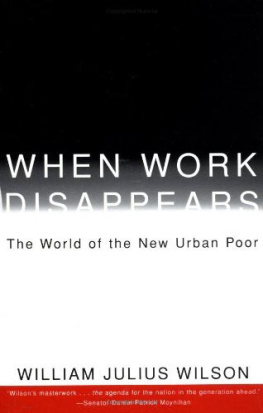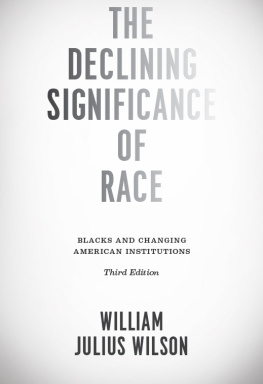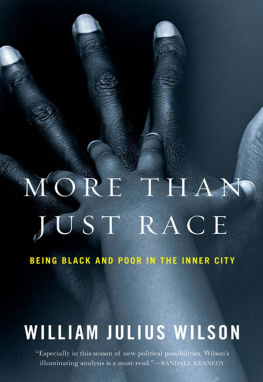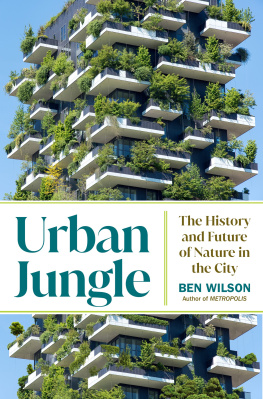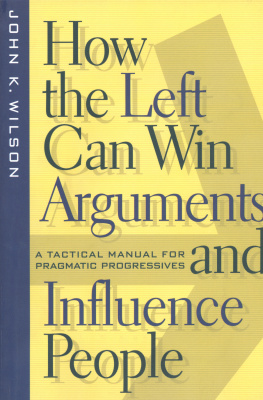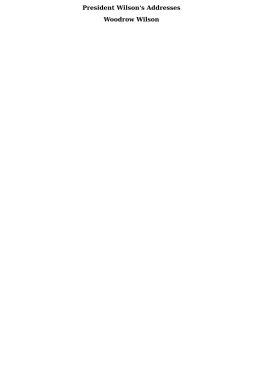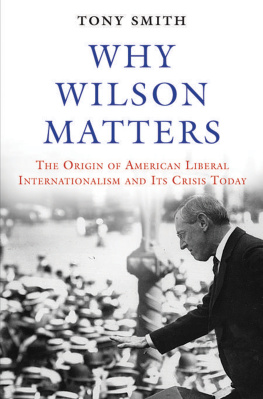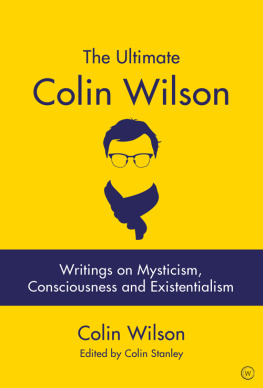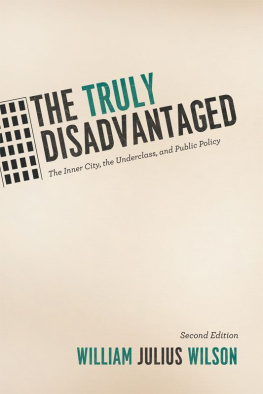William Julius Wilson was a member of the faculty at the University of Chicago for twenty-four years and is currently the Malcolm Wiener Professor of Social Policy at Harvard University. He is past president of the American Sociological Association and has been elected to the National Academy of Sciences, the American Academy of Arts and Sciences, and the American Philosophical Society. His previous books include Power, Racism, and Privilege; The Declining Significance of Race; and The Truly Disadvantaged. He lives with his wife in Cambridge, Massachusetts.
Also by WILLIAM JULIUS WILSON
Power, Racism, and Privilege
The Declining Significance of Race
The Truly Disadvantaged
Through Different Eyes (co-editor)
The Ghetto Underclass (editor)
Scociology and the Public Agenda (editor)
Poverty, Inequality and the Future of Social Policy (co-editor)
FIRST VINTAGE BOOKS EDITION, AUGUST 1997
Copyright 1996 by William Julius Wilson
Map copyright 1996 by Mark Stein Studios
All rights reserved under International and Pan-American Copyright Conventions. Published in the United States by Vintage Books, a division of Random House, Inc., New York, and simultaneously in Canada by Random House of Canada Limited, Toronto. Originally published in hardcover in the United States by Alfred A. Knopf, Inc., New York, in 1996.
The Library of Congress has cataloged the Knopf edition as follows:
Wilson, William J., [date]
When work disappears : the world of the new urban poor /
William Julius Wilson.first ed.
p. cm.
1. Urban poorUnited States.
2. Afro-AmericansEmployment.
3. Inner citiesUnited States.
1. Title
HV4045.W553 1996
362.0973091732dc20 9611803
eISBN: 978-0-307-79469-7
Random House Web address: http://www.randomhouse.com/
v3.1
To Beverly
CONTENTS
ACKNOWLEDGMENTS
In the preparation of this book I am deeply indebted to a large number of individuals and institutions. I owe a very special debt to Jennifer Hochschild, Alice OConnor, Sheldon Danziger, Tracey Meares, James Quane, and Robert Sampson, who read the entire first draft of the manuscript and provided detailed comments, including a number of challenging questions, that led to significant revision of parts of the book. Helpful comments were also provided by Brenda Smith, who carefully read . To my editor at Knopf, Victoria Wilson, I am grateful for first making me aware that I needed to go back to the drawing board on some of my policy recommendations and for helping me to improve the flow of the manuscript. To Susan Allen I owe a great deal for her skillful editing of the manuscript to improve its readability for a general audience. Finally, I am indebted to Jackie Harris, my secretary at the Center for the Study of Urban Inequality, who proofread the entire manuscript with considerable care; and to Ellen J. Hickok-Wall, who provided helpful editorial suggestions concerning the revision and reorganization of the final draft.
The research assistants who worked with me in preparing the complex data sets for analysis deserve special recognition. I particularly would like to single out Sophia Pedder, who worked on the ethnographic data and open-ended interviews from the Urban Poverty and Family Life Study (UPFLS); Rowena Abrahams, who worked on the same materials in addition to the UPFLS employers survey; and Sandra Smith, who worked on the employers survey. These three individuals displayed great imagination and dedication in analyzing, organizing, and integrating the detailed data sets. Also, I would like to thank Loc J. D. Wacquant for his help in the analysis of the UPFLS survey; Amit Sevak, Jean Twenge, and Simon Weffer for their work on the ethnographic materials, open-ended interviews, and employers survey of the UPFLS; Kelly Chong for her assistance in the compilation of the bibliography; and Jeffrey Morenoff for his work on the map of Chicago Community Areas. This book also benefited from the help I received from Bruce Rankin, Research Coordinator for the Center for the Study of Urban Inequality at the University of Chicago. Rankin worked with me in analyzing the data from all three of the studies I directed and on which this book is largely basedthe UPFLS, the Woodlawn and Oakland neighborhood study, and the study of the effects of high-risk neighborhoods on adolescent social development.
The data collection for these three studies involved the work of a number of faculty and students at the University of Chicago. The UPFLS included a large team of researchers. The project was administered by Robert Aponte. Raymond Smith and Richard Taub, two faculty members at the University of Chicago, supervised the research of the ethnographic team, which included Nan Astone, Darnel Breslau, Major Coleman, Karen Freel, Antonia Gutierrez-Marquez, Sharon Hicks-Bartlett, Marilyn Krogh, Robert Laseter, Guadalupe Rodriguez-Gomez, Martha Van Haitsma, and Daniel Wolk. Raymond Smith also supervised the work of a team of research assistants who conducted the open-ended surveys of inner-city residents. This group included Major Coleman, Ming Chin, Joleen Kirschenman, Matthew Lawson, Patricia Porter, Michael Reynolds, Martha Van Haitsma, and Loc J. D. Wacquant. Mark Testa and Marta Tienda, members of the University of Chicago faculty, supervised the data gathering for the large closed-ended survey of the UPFLS. Other faculty members who worked on this survey were Donna Franklin, Delores Norton, and Michael Sosin. I would also like to thank the staff of the National Opinion Research Center (NORC) at the University of Chicago who worked on the large survey, including Sameer Abraham, Virginia Bar-tot, Barbara Campbell, Martin Frankel, Mary OBrien, and David Pepper. NORC conducted the face-to-face interviews using the closed-ended questionnaire.

